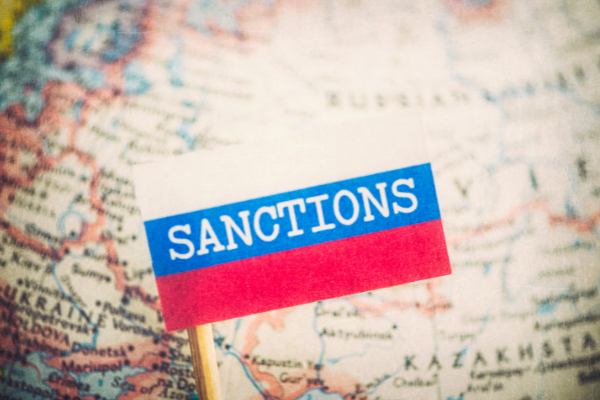BY:
SHARE:

In April 2023, the UK government announced restrictions on the import of Russian-originating iron and steel products, with the EU publishing the EU restrictive measures in June 2023. Strong & Herd has taken note of the fact that a significant number of our clients are encountering challenges related to these regulations, particularly when it comes to their EU suppliers.
Both regulations introduced Russian trade sanctions banning the import of certain iron and steel products that contained raw material (iron/steel) originating from Russia that had been processed in third countries.
Since the UK now serves as a third country for the EU, having exited the Customs Union, it's important to note that both sets of regulations could impact British businesses engaged in the trade of affected goods within the supply chain. Consequently, companies focusing on due diligence might encounter confusion when complying with these restrictive measures. The EU and UK compliance requirements for the respective measures have subtle differences.
Both sets of regulations share a common goal, namely to negatively impact Russian exports of commodities key to the Russian economy; both the EU and the UK adhere to a working practice that prioritises the implementation of robust controls for the import, acquisition, and transfer of products originating from Russia and the prevention of circumvention of restrictive measures.
Further information from Strong & Herd
Facts:
- The UK sanctions came into force on the 30th September 2023
- The EU restrictions are being implemented in three phases, depending on the tariff classification of the imported iron and steel goods, with the first phase already in force from the 30th of September 2023.
- Phases two and three as follows: 1 April 2024 and 1 October 2024
The EU-phased approach facilitates the gathering of compliance evidence regarding regulations for individuals engaged in the trade of goods subject to EU controls.
Neither EU member states nor the UK have any transitional period. For the UK, the controls on imports apply from the 30th September, 2023.
UK Guidance
The UK Guidance advises that traders should be prepared to present documentation demonstrating evidence of a good’s supply chain, which must be consistent with the prohibitions under the regulations. The documentary evidence requested should clearly indicate the following:
- the country of origin of the iron and steel products processed in the third country (or third countries) after the fact.
- the date that the iron and steel product left its country of origin.
- the country(s) and facility(s) where processing has taken place.
The guidance suggests an example of evidence may include. Still, it is not limited to a Mill Test Certificate (MTC) or Mill Test certificate (MTC) where the relevant information cannot be summarised in a single document.
- The UK regulation does not give a timeline for collating evidence. Therefore, it could be advisable to determine a sound supply chain history for goods to be supplied.
- The UK control does not apply to UK domestic deliveries. However, a UK business may need evidence from a UK supplier regarding goods origin to support their onward supply.
- There is no date stated in the UK regulation when affected goods were exported from Russia for processing.
Therefore, if a UK trader has goods for import that incorporate Russian-originating products, they are forbidden for import without necessary compliance evidence in place.
- The border authorities may stop goods captured under the restricted tariffs if they suspect that goods may fall under this import control. The trader must provide the compliance data at that point.
Point of clarity: An MTC is not a regulatory import document to be provided for a declaration. An MTC is to be presented as evidence of compliance with the regulation if requested by the authorities.
- Unlike the EU, there is no positive requirement in the UK’s Russian sanctions to provide evidence of origin. However, the UK guidance on third-country iron and steel clarifies that traders are expected to carry out due diligence on the origin of affected products and may be requested to present evidence of the supply chain of goods at the border.
For clarity, breaching sanctions is a criminal offence in the UK and UK traders will need to ensure they have implemented robust due diligence and supply chain controls relating to the origin of their goods.
The link to the UK Government Guidance with a list of Tariff Codes in Chapters 72 and 73 affected by the restrictions is below.
The link to the UK regulation is below, with Iron and Steel details in Schedule 3B.
https://www.legislation.gov.uk/uksi/2019/855/contents
EU Guidance
- The EU regulations place an obligation on importers to provide evidence of the country of origin for the iron and steel incorporated products used in the processing of products in third countries, the purpose being to ensure that no Russian-origin materials are incorporated into the final products being imported into the EU.
- The EU Regulation applies to all EU member states, but this does not mean that each country's controls will be uniform.
There will be nuances in compliance requirements in each separate member state on imports from 3rd countries into the EU.
- The UK is a third country for import purposes into the EU; therefore, if a UK business is supplying goods captured under the controls, the EU customer may require a varying degree of evidence to support their supply chain compliance with the regulations. Failure to provide the proof could prevent goods from being imported into the EU.
- The EU has published a suggested basket of evidence provision for EU member states. Again, the requirement for what that ‘basket’ consists of will be subject to national controls. To date, only the German authorities have issued clear guidance.
Among the suggestions for compliance provision are Milling Test Certificates, invoices, invoice statements and suppliers’ declarations.
The EU has published FAQs, which may help UK traders determine the evidence they need to provide on-demand to their EU customers. Article 3g(1)(d) at the link below:
OneCall™ Email assistance as and when required; A one-call solution for all your import, export and customs enquiries. Export help. Import help. Customs help.
Stay informed about customs and international trade matters by subscribing to our OneCall™ service. This comprehensive offering includes a dedicated email helpline for support, timely practical updates direct to your inbox (Did You Know?), monthly UK Customs & Trade Briefings and access to an interactive members' area with an exclusive community for our subscribers.
International Trade Updates & Spotlight Newsletter
Subscribe to our free information emails covering international trade topics...









